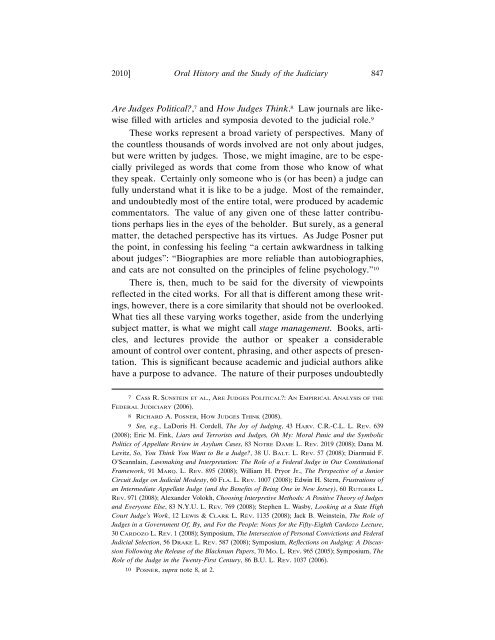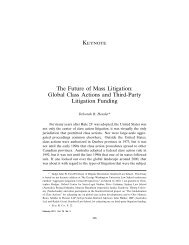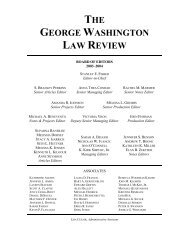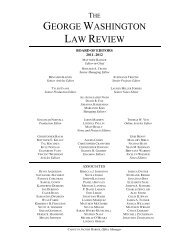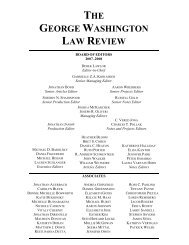View PDF - The George Washington Law Review
View PDF - The George Washington Law Review
View PDF - The George Washington Law Review
You also want an ePaper? Increase the reach of your titles
YUMPU automatically turns print PDFs into web optimized ePapers that Google loves.
2010] Oral History and the Study of the Judiciary 847<br />
Are Judges Political?, 7 and How Judges Think. 8 <strong>Law</strong> journals are likewise<br />
filled with articles and symposia devoted to the judicial role. 9<br />
<strong>The</strong>se works represent a broad variety of perspectives. Many of<br />
the countless thousands of words involved are not only about judges,<br />
but were written by judges. Those, we might imagine, are to be especially<br />
privileged as words that come from those who know of what<br />
they speak. Certainly only someone who is (or has been) a judge can<br />
fully understand what it is like to be a judge. Most of the remainder,<br />
and undoubtedly most of the entire total, were produced by academic<br />
commentators. <strong>The</strong> value of any given one of these latter contributions<br />
perhaps lies in the eyes of the beholder. But surely, as a general<br />
matter, the detached perspective has its virtues. As Judge Posner put<br />
the point, in confessing his feeling “a certain awkwardness in talking<br />
about judges”: “Biographies are more reliable than autobiographies,<br />
and cats are not consulted on the principles of feline psychology.” 10<br />
<strong>The</strong>re is, then, much to be said for the diversity of viewpoints<br />
reflected in the cited works. For all that is different among these writings,<br />
however, there is a core similarity that should not be overlooked.<br />
What ties all these varying works together, aside from the underlying<br />
subject matter, is what we might call stage management. Books, articles,<br />
and lectures provide the author or speaker a considerable<br />
amount of control over content, phrasing, and other aspects of presentation.<br />
This is significant because academic and judicial authors alike<br />
have a purpose to advance. <strong>The</strong> nature of their purposes undoubtedly<br />
7 CASS R. SUNSTEIN ET AL., ARE JUDGES POLITICAL?: AN EMPIRICAL ANALYSIS OF THE<br />
FEDERAL JUDICIARY (2006).<br />
8 RICHARD A. POSNER, HOW JUDGES THINK (2008).<br />
9 See, e.g., LaDoris H. Cordell, <strong>The</strong> Joy of Judging, 43 HARV. C.R.-C.L. L. REV. 639<br />
(2008); Eric M. Fink, Liars and Terrorists and Judges, Oh My: Moral Panic and the Symbolic<br />
Politics of Appellate <strong>Review</strong> in Asylum Cases, 83 NOTRE DAME L. REV. 2019 (2008); Dana M.<br />
Levitz, So, You Think You Want to Be a Judge?, 38 U. BALT. L. REV. 57 (2008); Diarmuid F.<br />
O’Scannlain, <strong>Law</strong>making and Interpretation: <strong>The</strong> Role of a Federal Judge in Our Constitutional<br />
Framework, 91 MARQ. L. REV. 895 (2008); William H. Pryor Jr., <strong>The</strong> Perspective of a Junior<br />
Circuit Judge on Judicial Modesty, 60 FLA. L. REV. 1007 (2008); Edwin H. Stern, Frustrations of<br />
an Intermediate Appellate Judge (and the Benefits of Being One in New Jersey), 60 RUTGERS L.<br />
REV. 971 (2008); Alexander Volokh, Choosing Interpretive Methods: A Positive <strong>The</strong>ory of Judges<br />
and Everyone Else, 83 N.Y.U. L. REV. 769 (2008); Stephen L. Wasby, Looking at a State High<br />
Court Judge’s Work, 12 LEWIS & CLARK L. REV. 1135 (2008); Jack B. Weinstein, <strong>The</strong> Role of<br />
Judges in a Government Of, By, and For the People: Notes for the Fifty-Eighth Cardozo Lecture,<br />
30 CARDOZO L. REV. 1 (2008); Symposium, <strong>The</strong> Intersection of Personal Convictions and Federal<br />
Judicial Selection, 56 DRAKE L. REV. 587 (2008); Symposium, Reflections on Judging: A Discussion<br />
Following the Release of the Blackmun Papers, 70 MO. L. REV. 965 (2005); Symposium, <strong>The</strong><br />
Role of the Judge in the Twenty-First Century, 86 B.U. L. REV. 1037 (2006).<br />
10 POSNER, supra note 8, at 2.


